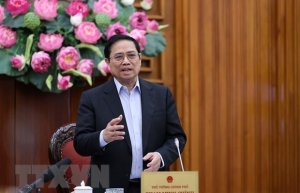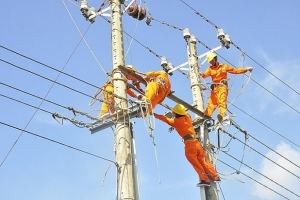Addressing power shortages a prerequisite to economic stability
Dorsati Madani, senior country economist at the World Bank in Vietnam, last week said that to ensure economic stability featured with stable production and an increase in investment, “one of the biggest priorities now is to establish a stable power transmission system, with solutions to address power shortage problems.”
“Power is vital for production in Vietnam now, and it is also a significant input for economic growth. Investors and enterprises don’t want to suffer from power shortage problems,” Madani said.
“In the recent summer, sudden power cuts caused great losses of 0.3 per cent of GDP to the national economic growth. The power sector has been an enabler of Vietnam’s fast and inclusive economic development over the past three decades. However, if power shortages and power cuts continue, Vietnam’s economic growth will continue to be undermined.”
 |
| Power shortages are causing short- and long-term issues for the operations of many enterprises |
By the end of 2021, 99.8 per cent of the population had access to electricity. Since the turn of the century, the power sector was able to serve a parallel 10 per cent annual electricity demand growth by installing a 16-fold larger generation capacity, from 5GW in 2000 to 81GW in 2023.
Transmission backbone lines also expanded almost four-fold over the same timeframe, and overall the sector has provided reliable electricity services for a growing population and the economy.
However, during May and June this year, northern Vietnam experienced recurrent power outages that affected households and enterprises on a large scale. In May, a peak demand supply deficit of 5.4GW occurred. The situation improved over June, and was resolved in July due to increased water availability.
“Power shortages during dry season also occurred in the summer of 2022 with an estimated peak demand supply deficit of 1.8GW. The preliminary estimate of economic costs for the May-June power outages is about $1.4 billion (or 0.3 per cent of GDP),” said the World Bank in its Vietnamese economic outlook released two weeks ago.
Such a financial loss has been calculated based on an estimated unserved demand of 36GWh in 2022 and about 900GWh estimated for May and June.
The World Bank cited a small industry survey conducted by the European Chamber of Commerce in Vietnam (EuroCham) among its members in June as stating that businesses in the north reported losses of up to 10 per cent of revenues.
Based on the estimated supply deficit through June, unserved energy demand will also result in lost revenues for Vietnam Electricity (EVN) of approximately $75 million.
Supply imbalances are currently a northern issue, where demand has been growing at a higher rate of 10 per cent compared to 8.5 per cent nationwide, and been becoming more seasonal in May-July. This results from the combined effect of a supply reliance on hydro and coal-based generation and delays in generation and transmission investments, the latter preventing access to large surplus capacity in the south of about 20GW.
“Prompt action is needed to mitigate future risks to energy security and economic losses,” the World Bank said. “Demand side management interventions can be deployed immediately to tackle power shortages, for example load shifting of industrial loads.”
According to the World Bank, critical short-term measures include avoiding any delays in the 2024 and 2025 schedules for power plant commercial operations; fast-tracking approval and implementation of transmission investments; and diversifying supply resources, from the composition of the energy mix by 2025 to increased reliance on regional imports.
“Energy efficiency measures can also have a relevant impact if compulsory targets and a monitoring system are immediately established as per the Law on Energy Efficiency and Conservation and through secondary regulatory instruments,” the World Bank said.
Under a Q2 survey conducted by EuroCham over its 1,300 members across a diverse range of sectors, respondents lamented the negative impacts of power shortages on their operations.
The survey report highlights the pressing concern of power shortages that significantly impacted businesses during the survey period. Although there has been some relief due to recent rainfall, around 60 per cent of respondents experienced the repercussions of these shortages on their business operations. This manifested in reduced operational efficiency, decreased productivity, and disruptions in production and services.
Ensuring long-term solutions to address power supply stability remains a priority for sustaining business performance and overall economic resilience.
“It is crucial now for the Vietnamese government to come up with long-term plans to address the recent power shortage problem, considering its cyclic nature. By taking prompt and comprehensive action, we can not only attract foreign investment but also ensure a resilient economy capable of overcoming future obstacles,” said EuroCham chairman Gabor Fluit.
The Korean Chamber of Commerce in Vietnam said that power cuts in this summer forced many of its member companies to halt operations and miss deadlines for orders, with the working time of their employees seriously affected.
“South Korean firms suffered dual losses. Facing power cuts without prior notice, the workers still went to the factories and sat idle. Meanwhile, the production lines had to suspend operations and the companies still had to pay salaries,” said chairman Hong Sun.
“Sudden power cuts have also marred machines, affecting the quality of products. What is more, suspending operations has also undermined the completion of orders, and even delayed exports,” Sun added.
The General Statistics Office reported that Vietnam’s production and distribution increased 4.1 per cent on-year in July and 1.4 per cent in the first seven months of 2023.
EVN reported that in the first seven months, the total domestically produced electricity volume was estimated to be 161.8 billion, up 2.7 per cent compared to last year, but 862 million kWh lower than the initial plan for 2023.
 | PM stresses urgent need for keeping power supply, demand balanced Prime Minister Pham Minh Chinh chaired a meeting in Hanoi on April 3 to look into the electricity supply and the provision of coal and gas for power generation. |
 | EuroCham proposes solutions to ongoing power shortages The European Chamber of Commerce in Vietnam (EuroCham) wrote a letter to the Ministry of Industry and Trade (MoIT) to propose a series of short- and long-term measures designed to alleviate the effects of the ongoing power shortages. |
What the stars mean:
★ Poor ★ ★ Promising ★★★ Good ★★★★ Very good ★★★★★ Exceptional
Related Contents
Latest News
More News
- IP alterations shape asset strategies for local investors (January 22, 2026 | 10:00)
- 14th National Party Congress: Vietnam - positive factor for peace, sustainable development (January 22, 2026 | 09:46)
- Japanese legislator confident in CPV's role in advancing Vietnam’s growth (January 22, 2026 | 09:30)
- 14th National Party Congress: France-based scholar singles out institutional reform as key breakthrough (January 21, 2026 | 09:59)
- 14th National Party Congress: Promoting OV's role in driving sustainable development (January 20, 2026 | 09:31)
- 14th National Party Congress affirms Party’s leadership role, Vietnam’s right to self-determined development (January 20, 2026 | 09:27)
- Direction ahead for low-carbon development finance in Vietnam (January 14, 2026 | 09:58)
- Vietnam opens arms wide to talent with high-tech nous (December 23, 2025 | 09:00)
- Why global standards matter in digital world (December 18, 2025 | 15:42)
- Opportunities reshaped by disciplined capital aspects (December 08, 2025 | 10:05)

 Tag:
Tag:




















 Mobile Version
Mobile Version